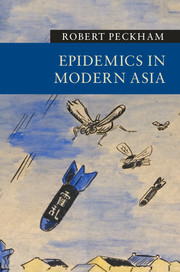4 - War
Published online by Cambridge University Press: 05 May 2016
Summary
War and infectious disease are often viewed as ‘fatal partners.’ On the face of it, the connection between conflict and disease appears self-evident. Conflicts amplify disease risks by creating conditions conducive for disease to spread; as military personnel move and as non-combatant populations get displaced, the likelihood of epidemic outbreaks increases. The destruction of infrastructure and disruption to services, including vector control, may produce environments where diseases are more likely to take hold. It has been argued that dengue fever became hyper-endemic in regions of Southeast Asia during and in the aftermath of the Second World War, not only due to the spread of genus Aedes mosquitoes (notably Aedes aegypti), which are vectors of the dengue virus, but as a result of urbanization and environmental degradation, which created mosquito breeding grounds. Epidemics of dengue hemorrhagic fever were consequences of this changing ecology. Wars have also been crucial in the spread of plague (Chapter 1). Defoliation in southern Vietnam as a result of US herbicide spray missions to destroy agricultural land and forest cover in enemy held territory during the Vietnam War (1964–1975), coupled with the collapse of local infrastructure, are thought to have led to increased contact between humans and wild (so-called ‘sylvatic’) sources of the disease.
War has also been a spur to migration. Those displaced may lack acquired immunity to diseases that are endemic in the areas they move to (Chapter 3), and they may introduce new diseases. Migrants may be physically and emotionally traumatized, and war may produce food insecurity and malnutrition. In crowded refugee camps, the interplay of all these factors may lead to epidemics. Often different diseases are intertwined and their co-emergence and co-transmission are associated with specific socio-political conditions: for example, discrimination, poverty, and violence. The term ‘syndemic’ has been used to describe the interaction of two or more co-existent diseases, as well as the social and economic inequities that drive them.
Some historians, however, have taken a more skeptical view of this straightforward correlation between war and epidemics, calling attention to changing ideas about war epidemics over time. The war–epidemic relationship is often treated as self-explanatory and has become so entrenched and taken for granted that there has been relatively little critical attention paid to the dynamics of their co-evolution.
- Type
- Chapter
- Information
- Epidemics in Modern Asia , pp. 193 - 249Publisher: Cambridge University PressPrint publication year: 2016

